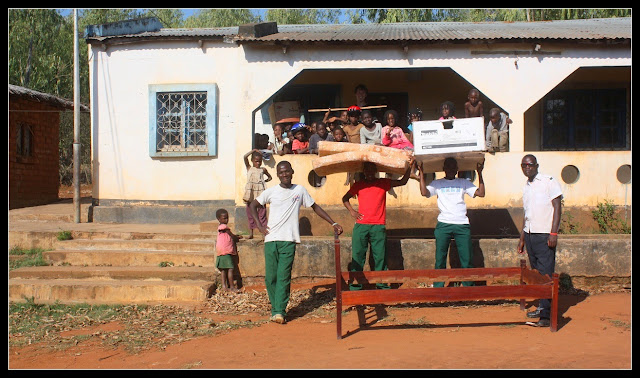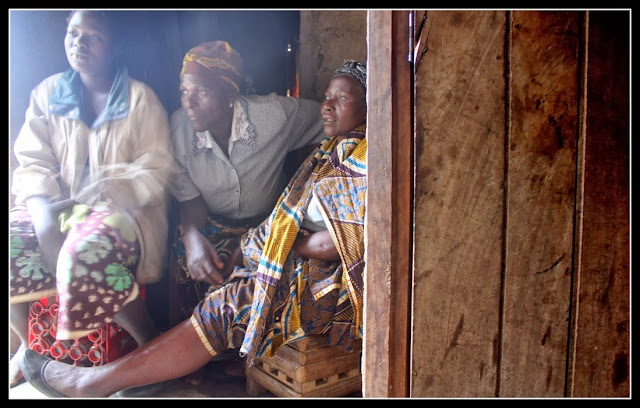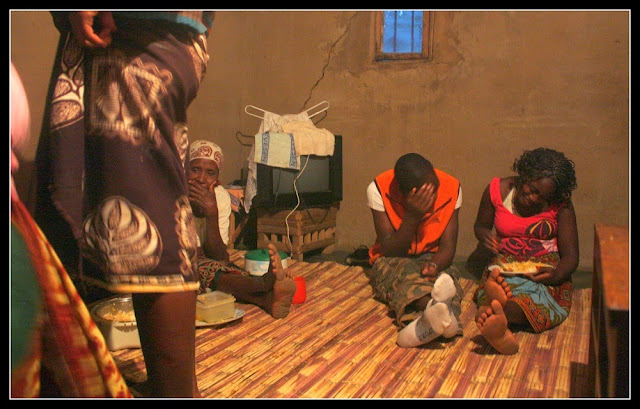Romao got married on a Tuesday afternoon. It was a school day for the bride and groom, but both of them stayed home to work. Romao was tasked with bringing soda from Malawi. Teresa, the bride, stayed home to help cook xima.
We didn't see Romao all morning. He ran over to ask for 70 Meticais at 6 o'clock in the morning ("For mom to buy a box of laundry soap") and then disappeared for the rest of the day. His little sisters, however, were overwhelmingly present.
"Casa-mento!" sang Tabita. She skipped around the porch. "Casamento, casamento!"
Her older sister hung in the doorframe. "Make a cake!" Feta chanted. "Make a cake!"
It was a rainy, misty morning, but I braved the elements to walk to the muddy marketplace and launch a search for butter. Then, with margarine in one hand, flour in the other, and an umbrella perched between my ear and shoulder, I made my way back home to start to bake a cake. I figured that I hadn't bought Romao a present, so this was the least that I could do.
Thank goodness it was a rainy day. Otherwise, my kitchen would have been stifling hot. Over the course of the early afternoon, I made four large cakes in our little toaster oven (two for the wedding, one for a fellow teacher, and another for myself) and was just finishing the fourth when Feta came running and sliding onto the veranda.
"Now!" She said, panting. "Come now! Bring your camera!"
Well, I wasn't dressed for a wedding, and I knew it. But what should someone wear to a wedding in Mozambique? I tossed my camera to Feta and ducked into the back room. I chose a simple shirt and my newest capulana, wrapping it twice around my waist.
A large crowd was surging up the path, chanting and singing and waving branches with green leaves. The bride-to-be was nestled between her mother and older sister, near the middle of the pack. She was standing with her head down, underneath a make-shift canopy made from capulana. She appeared to be... sad. Considering the cheerful crowd around her, the bride looked strangely solemn.
The mass of people had already arrived in Romao's yard by the time that I'd stuck my head out of the front door, and, by the time that I'd tied up my hair, they had already collected Romao and shoved him into place beside his bride-to-be. Immediately, he assumed the same somber position with the hanging head and half-closed eyes.
The group surged again and turned around, still chanting and singing and waving their sticks. The bride and groom were whisked down the path to Teresa's family home. In my flip-flops and double-wrapped capulana, I went running after them.
The crowd stopped in front of Teresa's house, and clumped around the front veranda. Directly in front of the front step, the betrothed were stopped and waiting. Prayers were said, and the crowd gave rounds of shouts and ululations. The little kids milled about, still waving sticks and leaves.
Then, silence. The ceremony was beginning.
Dan and I were ushered onto the front porch with the bride and groom and their respective families. Not only were we the resident A'zungu (which does grant special privileges), but we were also the only ones who owned a camera.
Teresa and Romao sat in the middle of the veranda, holding hands. On Romao's left side, sat his cousin. On Teresa's right side, sat her sister. The bride's mother and father sat in the corner of the veranda, and Romao's mother and uncle sat next to me. The rest of the crowd stood down in the yard, peering over the wall of the porch. The kids were bouncing around on tip-toe and scrambling to get a closer look.
The ceremony opened with a pitcher of maheu (sweet corn drink). Every member of the bridal party drank from the same cup, which was offered by the officiant. With their hands at their sides and their eyes still cast downward, all four drank a full cup, then waited to have their faces cleaned. It was a slow and ceremonial process.
Words were said and the women in the crowd turned up their faces in ululation, but Dan and I just watched. Everything was passing by in a language that we couldn't understand. We relied on the flow of the crowd to tell us when to smile, clap, or to stay silent and somber.
After the sharing of the drink, the officiant called for a plate. The plate was demonstrated to the crowd, and then placed before the bride and groom. Romao's uncle tapped me on the shoulder and translated the words-
"We have to make an offering for the newly married couple."
Scores of people pored onto the porch, dropping small coins and bills and pieces of paper. Some people gave gifts instead, like bars of soap and cheap capulanas. There were shouts and cheers and li-li-li ululations from the crowd. I nudged Dan and he leaned sideways to drop two ten-Met coins onto the plastic plate.
Once all of the gifts had been assembled on the bench before the couple, the bride's uncle stepped forward to make the total count.
"423 Meticais!" He announced, waving a handful of coins. About 15 US dollars.
He then began to read notes and well-wishes from the members of the crowd. Most of the notes, I couldn't understand. But sometimes I heard a word that was familiar (Chikondi-- love, mbuzi-- goat), and could catch the drift of the sentiment.
Throughout the reading of the letters, the bride and groom held hands with one another, still staring resolutely at the floor.
Then, suddenly, the crowd surged and moved. The wedding party stood up to go inside, and I got a tap from Romao's uncle.
"We go inside now," he whispered. "For the second part of the ceremony."
And so we filed inside the house. The L-shaped front room was dimly lit from two small windows on the walls. There were four straw mats laid out on the concrete floor. The bridal party sat down first, on the straw mat against the back wall. Then, the rest of the crowd piled around. I was given a spot near the bride and groom, and would spend most of the ceremony staring at their shoes, which were jutting right in front of me.
Everybody sat.
The officiant knelt before the couple to give a ceremonial speech. The bride and groom nodded solemnly, still staring downwards at the ground. Most of the ceremony was beyond my comprehension, but a few works stuck with me.
"Chikondi, chikondi, zikomo, zikomo." Love, love, thank you, thank you.
Then, Romao's sister brought forth a suitcase. It was wrapped in a capulana, and obviously very heavy. There was a shuffling of legs as the onlookers made room.
"This is Romao's gift to his bride," Romao's uncle whispered.
The sister opened the suitcase and pulled out the objects, one by one. I saw immediately where all of his recent earnings had gone.
"Sopi," said the officiant, as the sister held up the box of laundry soap.
"Pratos," she said, next, switching to Portuguese. Romao's sister lifted the stack of plates and showed them to the onlookers.
Then, the girl started pulling out copious numbers of outfits.
"Saia," said the officiant, as the sister waved a skirt. "Saia," she said again. "Saia, saia, saia." In a country where most people only have three or four different changes of clothes, this must have seemed like an unbelievable bounty.
"Camisa," said the officiant. The sister showed a belted shirt. "Camisa, camisa, camisa, camisa. Chinelos. Camisa, camisa."
The ululations were deafening.
The sister repacked the suitcase and, with difficulty, lifted it onto her head and withdrew it from the crowd.
After the crowd had once more drawn silent, it was time for the elders to offer advice.
One by one, the oldest women in the crowd came forward to sit before the couple. They knelt with difficultly on the straw mat and offered words of wisdom. They were speaking directly to Teresa, but Romao was meant to hear and understand.
Romao's brother translated furiously in my ear.
"Many wishes for a long life and happiness...," he whispered. "Always remember this early love that you share.... remember your roles in the family and community... a woman's place is at her husband's side... and she will remain loyal for all her days.... never to take another husband or another lover... care for the children and for the growing family...."
All of the elders gave similar advice. Be loyal, they warned, scowling at the bride. Be loyal, and he will take care of you. Stay at home. Know your place.
After the fifth and final old woman had spoken, the onlookers erupted into cheers. "Li-li-li-li-li-li-li!" went the crowd. There was clapping and rocking and shouting and waving. The crowd started to move, once again.
This time, it was time for dinner.
Several women-- aunts and cousins and female neighbors-- had been tasked with the food preparation. They'd been cooking in teams, all morning since dawn.
A peek into the back room nearly rendered me speechless. I had never seen so much food. The piles (yes, piles) were utterly massive. There were seven giant pots of beans, ten pots of rice, and twelve bowls of cabbage salad. Four pots of meat were guarded near the back, with two full of chicken and two full of goat. At the center of the display, there were two forty-liter bacias of xima. Both basins were piled well over the top with mushy white patties, leaning almost perilously over the dirty, unpainted floor.
The women worked furiously in unison, piling food into smaller serving bowls and arranging it in the more public living area. Massive chunks of xima were scooped into bowls and delivered outside, to the waiting throngs of onlookers in the yard. Dan and I were served a full plate of cabbage salad, a full plate of rice, and a bowl of chicken carril.
"Eat!" Urged the onlookers. "Eat, eat! Don't wait!"
Dan and I looked on while the women continued to run around. Bowls of beans were brought out to the porch, and salad was served onto plates. Family groups clustered together around the serving bowls, pinching xima and salad and beans with their hands.
Dan shrugged and attacked the food with gusto.
"I like the chicken," he said. "It's good." I liked the rice and the salad, but was cautious of the meat.
We ate for about thirty minutes, watching the proceedings and chatting with Romao's brother, who gave us more information about the wedding ceremony.
"They're not sad, you know," said Danilo, pinching a bite of xima from his plate. "The bride and groom, I mean. They're just really embarrassed. They're shy people, and the ceremony makes them feel uncomfortable."
It became apparent that Dan and I would be unable to finish the five pounds of food that had been delivered to us, so the plates were taken outside to share with the rest of the neighbors.
After dinner, the proceedings were less formal. The kids came inside to climb all over us, and we let them take some pictures. Then, it was time to cut the cake.
"Where's the cake?" Asked Romao's uncle.
"What?" I said. "My cake? I was going to give it to Romao after..."
"You should run home and get it now," he said.
"But there are so many people..." I said. I looked around at the crowd. I hadn't tried to count, but I knew that there were at least one hundred people present.
"You should present it as an offering," he said.
And so I ran through the mist to go fetch the cake. It was nearly dark outside.
When I re-entered the house, with both the cakes in hand, there was a rolling wave of ululation. Applause greeted me as I walked in the door. I paused in the doorway, looking around. Then, the situation dawned on me.
I had just brought in the wedding cake. The actual wedding cake.
There was a lot of shuffling around as the wedding party moved to accommodate the (lumpy, unfrosted) plain yellow cakes. The bride and groom were seated on benches, and the cakes were placed on an overturned crate. I was asked to sit in front, to take the pictures of the cutting.
The cakes, which had seemed so large in relation to my own little oven, now looked tiny on the overturned crate. Bless the officiant, though. She charged right ahead. She cut the first cake into 64 bite-sized pieces, and arranged the pieces on a plate.
"Take a picture," she urged. "Of the bride and groom." Then she turned to Romao.
"Feed the bride," she said. She wheeled back to me.
"Take a picture!" She said.
We all obliged.
After the bride and groom had each gotten their first bites, it was time to photograph the rest of the family. The bride's mother and father sat behind the cake and fed each other one bite.
"Take a picture, take a picture!" Ordered the officiant.
Then Romao's mom and stepfather sat to eat the cake, and fed each other dutifully.
"Take a picture, take a picture!"
Finally, after several rounds of photos of people eating cake (including the kids, the cousins, the aunts, the uncles, the officiant, and us), the cake was delivered around to the masses. Somehow, they made those two cakes stretch, and everyone was happy.
Sodas were delivered, and I grabbed a cup to share mine with the kids. Then, as a sleepy Chovita slid off my lap and crawled to the straw mat to go take a nap, I decided that it was time to go. I was getting tired, too. It was 8 o'clock at night.
The wedding continued for a while before dwindling completely, but it never got raucous or wild. We could hear the muffled sounds of the celebration from the window to our room.
I thought about it as I went to bed that night. I had just attended my first Mozambican wedding, and I was very impressed and pleased. The ceremony wasn't religious or very official at all. Nor was it sappy or over-the-top. It was just a simple ceremony-- A celebration of love and family.
























































